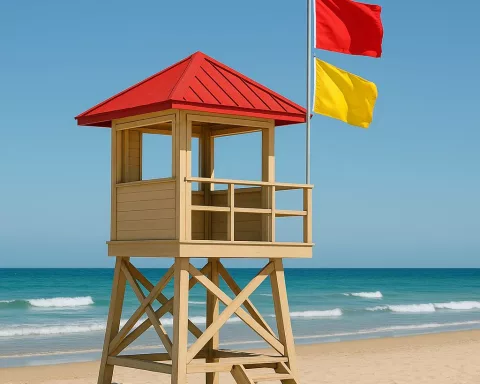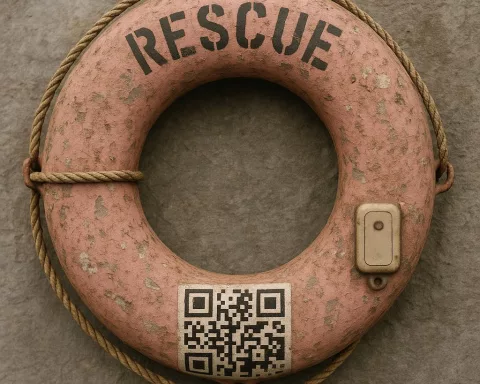The National Sea Rescue Institute (NSRI) has issued a warning about the upcoming spring tide peak, which will increase the strength of rip currents. Rip currents are dangerous and can drag even strong swimmers into deep waters. The NSRI advises people to exercise caution near the shoreline, swim only in areas guarded by lifeguards, and to float on their back and swim parallel to the beach if caught in a rip current. It is important to prioritize safety when enjoying the stunning coastline of Cape Town.
Exercise Caution During the Spring Tide Peak
The National Sea Rescue Institute (NSRI) has issued a warning to seaside adventurers about the impending spring tide peak, which is forecasted to amplify the intensity of rip currents. The NSRI advises everyone to tread with caution near the shoreline and restrict swimming to beaches guarded by lifeguards. If caught in a rip current, it is advisable to float on your back and swim parallel to the beach to exit the current.
A significant alert has been sounded by the National Sea Rescue Institute (NSRI), an entity committed to the preservation of maritime safety. This warning holds great importance to beach lovers and coastal explorers alike. The impending high point of the spring tide this week is forecasted to amplify the intensity of rip currents, a natural occurrence that can prove dangerous to those caught unawares.
Rip currents, for those who might not be familiar with the term, are strong, slender water channels that surge with great speed away from the shore. They are created when surplus water, gathered along the shore by wind and waves, swiftly flows back towards the sea. The sheer force of these currents can drag even the strongest swimmers into the deeper ocean waters, thereby posing a significant risk.
Exercise Caution During the Spring Tide Peak
In an effort to protect beach enthusiasts and coastal wanderers, the NSRI has requested everyone to tread with caution near the shoreline, particularly as we gear up for the spring tide peak slated for 13th December. The spring tide phase is slated to persist into the following weekend, overlaying a prolonged period of heightened risk.
The NSRI further stresses that swimming should be restricted to beaches guarded by lifeguards. It is paramount to swim within the safe swimming zones, which are marked by red and yellow flags. These flags are not just for show; they serve as visual markers highlighting areas where lifeguards are actively scanning for potential water hazards, including rip currents.
Ensuring Safety Inland and Beyond
But the NSRI’s warning is not limited to the seashore. Users of inland waters have also been advised to adhere to safety practices. The surge in water-related emergencies inland, even though not directly impacted by the spring tide, is a cause for concern for the NSRI. They are calling on everyone around both coastal and inland waterways to prioritize safety above all else.
Rip currents, being a natural occurrence, have certain distinct signs that aid in their identification. For example, surf zone water displaying a different hue compared to nearby waters is one such indication. The pattern of incoming waves may also shift, with waves often not breaking in a rip channel. The presence of seaweed, ‘clouds’ of sand, or debris flowing towards the backline where waves are taking shape in the surf zone could signal a rip current. Turbulent or rough water in the surf zone, appearing like a channel or river flowing away from the beach, is another clue hinting at a rip current’s presence.
What to Do if Caught in a Rip Current
If you ever find yourself trapped in a rip current, the NSRI advises against panicking. Trying to swim directly back to the shore against the current could lead to fatigue. It would be more advantageous to try to tread water or float on your back. Since rip currents gradually lose their force further out, this strategy serves to conserve energy. It’s also recommended to raise an arm and wave for help, drawing the attention of those on the beach to your predicament. To exit the current, it is advised to swim parallel to the beach, following which the waves could aid in returning to the shore.
Enjoying the Scenic Cape Town Safely
The splendor of Cape Town, with its majestic coastline and lively culture, is a sight to behold. This breathtaking panorama is best enjoyed with a 60-minute cruise available at a special price of R155, discounted from R310. For car enthusiasts or those planning a road trip, there are fantastic car deals, all priced under R100,000.
In conclusion, while the captivating beauty of the coastline is irresistible, it comes with its unique risks. It’s essential to pay heed to the advice of organizations like the NSRI, whose primary objective is to safeguard all water users. By staying informed and prioritizing safety always, we can continue to marvel at and relish all that the sea has to offer.
1. What is the National Sea Rescue Institute (NSRI)?
The National Sea Rescue Institute (NSRI) is an entity committed to the preservation of maritime safety. They issue warnings and provide guidance to beach enthusiasts and coastal wanderers to ensure their safety.
2. What is the NSRI warning about?
The NSRI has issued a warning about the upcoming spring tide peak, which will increase the strength of rip currents. Rip currents are dangerous and can drag even strong swimmers into deep waters.
3. How can we stay safe near the shoreline during the spring tide peak?
The NSRI advises people to exercise caution near the shoreline, swim only in areas guarded by lifeguards, and to float on their back and swim parallel to the beach if caught in a rip current.
4. What are the signs of a rip current?
Rip currents have certain distinct signs that aid in their identification, such as surf zone water displaying a different hue compared to nearby waters, the pattern of incoming waves may also shift, and the presence of seaweed, ‘clouds’ of sand, or debris flowing towards the backline.
5. What should we do if caught in a rip current?
If you ever find yourself trapped in a rip current, the NSRI advises against panicking. Trying to swim directly back to the shore against the current could lead to fatigue. It would be more advantageous to try to tread water or float on your back. To exit the current, it is advised to swim parallel to the beach and raise an arm and wave for help.
6. How can we enjoy the scenic Cape Town safely?
While enjoying the scenic Cape Town, it is important to prioritize safety. Swim only in areas guarded by lifeguards and follow the safe swimming zones marked by red and yellow flags. Additionally, stay informed about the NSRI warnings and guidance to ensure your safety.












